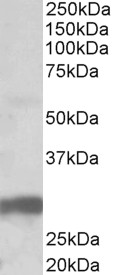Goat Anti-B7-H4 Antibody
Peptide-affinity purified goat antibody
- SPECIFICATION
- CITATIONS
- PROTOCOLS
- BACKGROUND

Application
| WB, E |
|---|---|
| Primary Accession | Q7Z7D3 |
| Other Accession | NP_078902, 79679, 242122 (mouse), 295322 (rat) |
| Reactivity | Human |
| Predicted | Mouse, Rat, Dog |
| Host | Goat |
| Clonality | Polyclonal |
| Concentration | 100ug/200ul |
| Isotype | IgG |
| Calculated MW | 30878 Da |
| Gene ID | 79679 |
|---|---|
| Other Names | V-set domain-containing T-cell activation inhibitor 1, B7 homolog 4, B7-H4, B7h.5, Immune costimulatory protein B7-H4, Protein B7S1, T-cell costimulatory molecule B7x, VTCN1 {ECO:0000312|EMBL:EAW56672.1} |
| Dilution | WB~~1:1000 E~~N/A |
| Format | 0.5 mg IgG/ml in Tris saline (20mM Tris pH7.3, 150mM NaCl), 0.02% sodium azide, with 0.5% bovine serum albumin |
| Storage | Maintain refrigerated at 2-8°C for up to 6 months. For long term storage store at -20°C in small aliquots to prevent freeze-thaw cycles. |
| Precautions | Goat Anti-B7-H4 Antibody is for research use only and not for use in diagnostic or therapeutic procedures. |
| Name | VTCN1 {ECO:0000312|EMBL:EAW56672.1} |
|---|---|
| Function | Negatively regulates T-cell-mediated immune response by inhibiting T-cell activation, proliferation, cytokine production and development of cytotoxicity. When expressed on the cell surface of tumor macrophages, plays an important role, together with regulatory T- cells (Treg), in the suppression of tumor-associated antigen-specific T-cell immunity. Involved in promoting epithelial cell transformation. |
| Cellular Location | Cell membrane; Single-pass type I membrane protein. Note=Expressed at the cell surface. A soluble form has also been detected. {ECO:0000255, ECO:0000269|PubMed:12818165, ECO:0000269|PubMed:15878339, ECO:0000269|PubMed:16782226} |
| Tissue Location | Overexpressed in breast, ovarian, endometrial, renal cell (RCC) and non-small-cell lung cancers (NSCLC). Expressed on activated T- and B-cells, monocytes and dendritic cells, but not expressed in most normal tissues (at protein level). Widely expressed, including in kidney, liver, lung, ovary, placenta, spleen and testis |

Thousands of laboratories across the world have published research that depended on the performance of antibodies from Abcepta to advance their research. Check out links to articles that cite our products in major peer-reviewed journals, organized by research category.
info@abcepta.com, and receive a free "I Love Antibodies" mug.
Provided below are standard protocols that you may find useful for product applications.
Background
B7H4 belongs to the B7 family (see CD80; MIM 112203) of costimulatory proteins. These proteins are expressed on the surface of antigen-presenting cells and interact with ligands (e.g., CD28; MIM 186760) on T lymphocytes.
References
B7-H4 expression promotes tumorigenesis in ovarian cancer. Cheng L, et al. Int J Gynecol Cancer, 2009 Dec. PMID 19955922.
B7-H4 gene polymorphisms are associated with sporadic breast cancer in a Chinese Han population. Zhang J, et al. BMC Cancer, 2009 Nov 11. PMID 19903360.
The negative co-signaling molecule b7-h4 is expressed by human bone marrow-derived mesenchymal stem cells and mediates its T-cell modulatory activity. Xue Q, et al. Stem Cells Dev, 2010 Jan. PMID 19788399.
Identification of a novel susceptibility locus for juvenile idiopathic arthritis by genome-wide association analysis. Hinks A, et al. Arthritis Rheum, 2009 Jan. PMID 19116933.
Serum-soluble B7x is elevated in renal cell carcinoma patients and is associated with advanced stage. Thompson RH, et al. Cancer Res, 2008 Aug 1. PMID 18676826.
If you have used an Abcepta product and would like to share how it has performed, please click on the "Submit Review" button and provide the requested information. Our staff will examine and post your review and contact you if needed.
If you have any additional inquiries please email technical services at tech@abcepta.com.













 Foundational characteristics of cancer include proliferation, angiogenesis, migration, evasion of apoptosis, and cellular immortality. Find key markers for these cellular processes and antibodies to detect them.
Foundational characteristics of cancer include proliferation, angiogenesis, migration, evasion of apoptosis, and cellular immortality. Find key markers for these cellular processes and antibodies to detect them. The SUMOplot™ Analysis Program predicts and scores sumoylation sites in your protein. SUMOylation is a post-translational modification involved in various cellular processes, such as nuclear-cytosolic transport, transcriptional regulation, apoptosis, protein stability, response to stress, and progression through the cell cycle.
The SUMOplot™ Analysis Program predicts and scores sumoylation sites in your protein. SUMOylation is a post-translational modification involved in various cellular processes, such as nuclear-cytosolic transport, transcriptional regulation, apoptosis, protein stability, response to stress, and progression through the cell cycle. The Autophagy Receptor Motif Plotter predicts and scores autophagy receptor binding sites in your protein. Identifying proteins connected to this pathway is critical to understanding the role of autophagy in physiological as well as pathological processes such as development, differentiation, neurodegenerative diseases, stress, infection, and cancer.
The Autophagy Receptor Motif Plotter predicts and scores autophagy receptor binding sites in your protein. Identifying proteins connected to this pathway is critical to understanding the role of autophagy in physiological as well as pathological processes such as development, differentiation, neurodegenerative diseases, stress, infection, and cancer.


